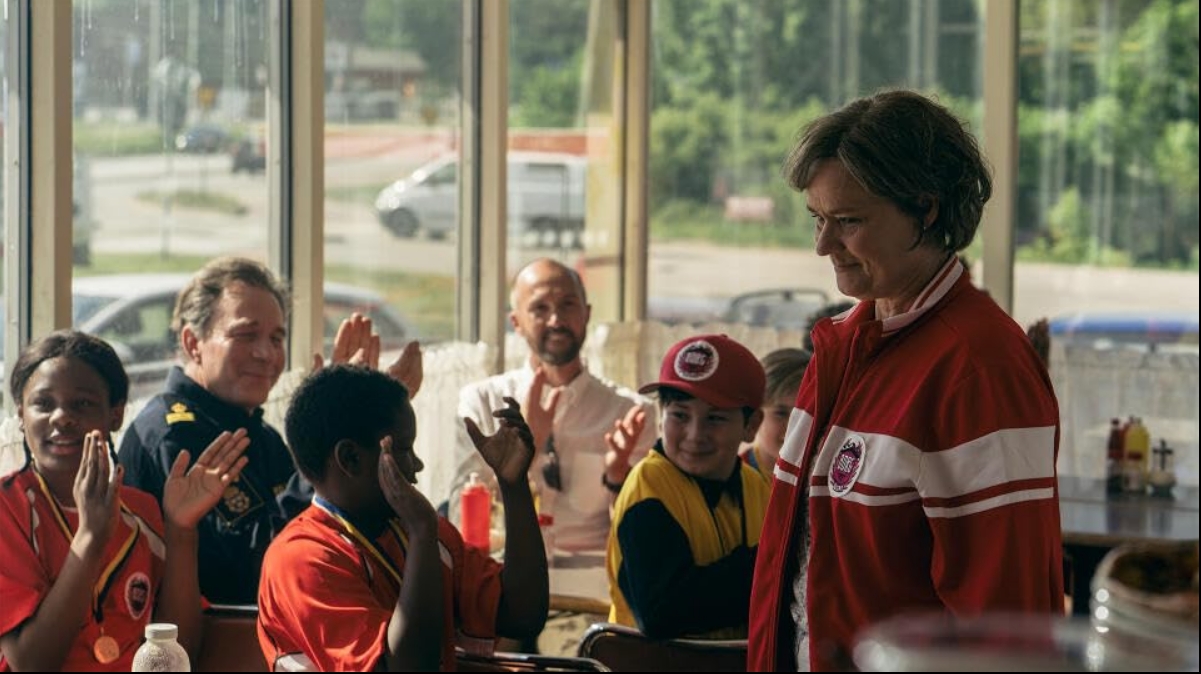By Katerina Taxiarxopoulou,
“How many breaths are we allowed to take beyond the confines of ourselves? How many pure emotions make us cheer out loud without a sense of shame? All passion is childish, it’s banal and naïve, it’s nothing we learn, it’s instinctive, and so it overwhelms us…Overturns us… It bears us away in flood… All other emotions belong to the earth, but passion inhabits the universe. That is the reason why passion is worth something.”
—Frederick Backman, quote from Britt-Marrie Was Here
In Fredrik Backman’s exquisite 2016 novel Britt-Marie Was Here, passion equals personal freedom. Over three hundred and four pages of pure comedy, as well as tragedy, the act of reconnecting with one’s inner child, engaging in creative play and living in the moment constitutes a turning point in the heroine’s journey of self-discovery and liberation. Like in every other book of his, in Britt-Marie Was Here Backman chooses to tell the story of a person who challenges social norms. The protagonist, Britt-Marie, is a sixty-three-year-old “nag-hag” woman who has just left her cheating husband and decided to find her first job for forty years (Britt-Marie Was Here).
When the readers first meet her, she is at a work finding service, exasperating the employees there with her uncompromising attitude and odd requests. According to reviewer Anni Johnson, at this point the author shows us “what the world sees: an odd, cantankerous woman who refuses to take no for an answer”
After she arrives in the impoverished area of Borg, a place in the middle of nowhere, where the social service sends her, Britt-Marie’s obsessions become even more intense. Her job and room are in the town’s old recreation center, which also works as a café, a pizzeria, a florist and a car repair shop. It is run by an alcoholic woman who sometimes sells illegal goods there. So, for the first week Britt-Marie walks around wide-eyed and with a jar of baking soda in hand, cleaning any surface she can find. When she finds out that the town’s shop does not have her favorite window cleaner available, she explodes. She also becomes terribly mean with the locals, who cannot understand her need for propriety and order. Given this description, it is expected that the first chapters of the book make the readers think of Britt-Marie as a rather unlikable character. So, they are really shocked to find out how much they actually love her, when they start receiving deeper insights into her backstory and the way she has been processing life and people.

Fredrik Backman creates complex characters who initially appear hard, but as he slowly peels every bit of dead skin on them, they reveal a tender inside. He also involves readers in this long process of character comprehension, as “he sets layers of interpretation” for them, writing his descriptions in figurative language. In other words, he uses his words in such a way that he does not tell the readers what it is, but rather shows them a picture of it (Frederic Backman’s Writing Style). For example, from chapter one prevails the imagery of Britt-Marie holding a notebook and a pencil, never a pen, so she can write a list of the tasks she needs to complete. Instead of making a straightforward comment, the author shows the heroine’s pressing need to feel she has control over her life, even though it has changed dramatically.
Britt-Marrie used to be a happily married, middle aged woman and a perfect housewife. She lived a great day every day, until she found out that her husband had been cheating on her with another woman. The book starts with the major inner shift this revelation creates to the heroine. For the first time, Britt-Marie decides to work and live by herself, for herself. While she is trying to do this, memories of past trauma emerge. After the death of her sister—the only person Britt-Marrie felt truly happy and free with— she devoted her life to taking care of her parents, then her husband and his distant children. According to a reviewer, “her willingness to accommodate has always been taken for granted and abused. Her own needs and dreams overlooked”
In the big city, Britt-Marie lives a life empty of strong emotions. She has no loving parents or husband, no friends and no personal interests. Nothing that can fill her life with meaning. What she is offering to the world goes unnoticed, much like herself does. On the other hand, in the impoverished area of Borg she finds a community of people who truly need her, as they too have been neglected. First, she takes care of the building that has been hosting these people, the recreation center. The renovation project helps her feel better as it creates a sense of control, but it does not allow her to extend the limits of her obsessions and finally be free. To unlock that door, the key is love and its natural outcome, passion.

Love in Britt-Marie’s new life grows slowly. Every day that passes by she takes a step closer to the people of Borg, and so the wall her prejudiced mind has created starts to fall down. Sharing a space with the alcoholic woman teaches Britt-Marie the importance of tolerance and that it is possible to like someone who’s beliefs and life decisions find her in complete disagreement. Spending time with Sami, Britt-Marie learns the value of friendship. She puts her fixed ideas about propriety on mute and becomes a listener. She sees that beyond the surface of the troublemaker, there is a teenage boy who has taken on the role of parent to his little siblings. She feels sympathy for him. Of course, as their relationship is one of equality, Sami toο listens to and understands Britt-Marie’s concerns. Most of all, he respects who she is and is always there to support her.
With the help of Sami, she becomes the coach of the kids’ football team. She knows nothing about football, but when the children ask her, she just cannot say no. In this final role she takes on, she finds her lost passion becomes a child again. She lets go off all reservation and gets overly excited, then disappointed; she cheers, she boos, she falls down crying. When her team suffers an injustice, she stands up for them. She is not afraid to become loud anymore, and when she does, she is heard.
“If you can be heard, then you exist”
—Frederick Backman, quote from Britt-Marrie Was Here
So, in the middle of nowhere, this woman manages to become a free human being, one who feels and is felt for. Britt-Marie Was Here is a hilarious, heart-warming and deeply existential story that can make a lost individual feel found.
References
- Britt-Marie Was Here. en.wikipedia.org. Available here
- BRITT-MARIE WAS HERE BY FREDERIC BACKMAN – BOOK REVIEW. novelonmymind.com. Available here
- FREDERICK BACKMAN’S WRITING STYLE. litpriest.com. Available here




